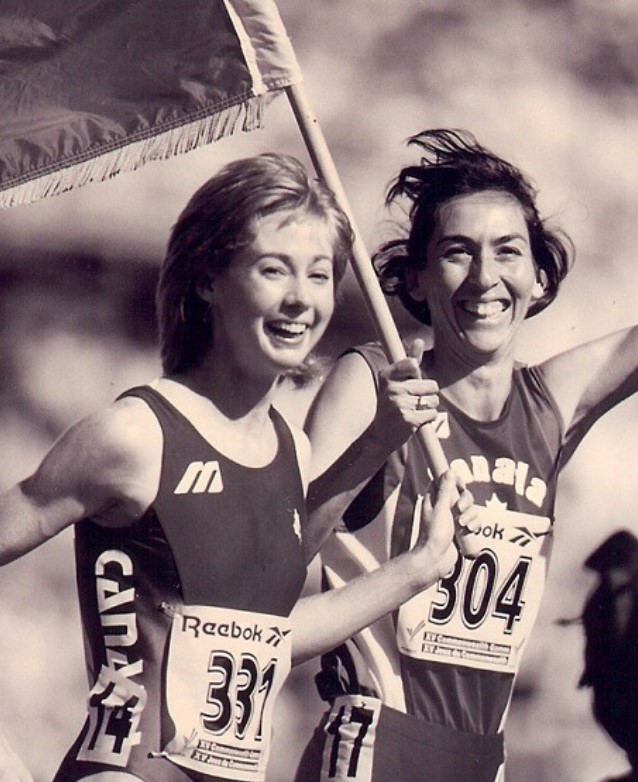Long-distance running has long been a popular sport in many Indigenous communities. Competitive long-distance running demands extended periods of intense, disciplined training, physical fitness, strength, endurance and emotional fortitude. A number of Indigenous athletes from Canada have earned international recognition for their long-distance running prowess. (See also Indigenous Olympians.)
1. Peter Deer (1 January 1878; died 30 July 1956; Mohawk)
Peter Deer was from Kahnawá:ke Mohawk Territory, on the south shore of the St. Lawrence River. He worked as a mechanic. At age 25 he appeared at the 1904 St. Louis Olympic Games, making him the first Indigenous athlete to represent Canada at an Olympics or any other international athletic event. Deer finished 6th in the 1,500 m race and third in the one-mile men’s handicap race. He also ran in the 800 m race, but did not place.
2. Tom Longboat (4 July 1886; died 9 January 1949; Onondaga)
Tom Longboat was born in Ohsweken, Six Nations of the Grand River, in central Ontario. Encouraged by Mohawk runner Bill Davis, in 1906 Longboat won Hamilton’s gruelling Around the Bay race. A year later he shaved five minutes off the old record to win the Boston Marathon. He also won the Toronto Ward Marathon three years in a row and the 1909 World Professional Marathon Championship. He competed for Canada in the 1908 Olympics in London, England, but collapsed from exhaustion before finishing. Longboat served as a dispatch runner for the Canadian Expeditionary Force in the First World War. He is a member of Canada’s Sports Hall of Fame and every year since 1951 the Tom Longboat Awards are given to the best Indigenous athletes in North America.
3. Alex DeCoteau (born 19 November 1887; died 30 October 1917; Métis-Cree)
Alex DeCoteau was born and grew up in the Red Pheasant Cree Nation in west-central Saskatchewan. He went to the residential school in Battleford. He moved to Alberta and, in 1909, joined the Edmonton Police Department, thereby becoming the first Indigenous police officer in Canada. DeCoteau won a number of races in Western Canada and then represented Canada in the 1912 Stockholm Olympics. He was doing well in the 5,000 m race but slowed due to a leg cramp and finished out of medal contention. DeCoteau enlisted with the Canadian Expeditionary Force in 1916 and, a year later, was killed by a sniper at the Battle of Passchendaele. DeCoteau was inducted into the Canadian, Alberta, Saskatchewan and Edmonton sports halls of fame.
4. Joseph Benjamin Keeper (born 21 January 1886; died 29 September 1971; Cree)

Joseph Keeper was born a member of the Norway House Cree Nation in Manitoba. He showed a passion for running while attending a residential school in Brandon. Keeper was a member of the Canadian Olympic team at the 1912 Stockholm Olympic games. He ran in the 10,000 m race and just missed winning a medal when he came fourth. Enlisting with the Canadian Expeditionary Force in 1916, Keeper served as a dispatch runner. Near the site of the historic battle of Vimy Ridge, he and Tom Longboat ran together and won the 1917 inter-Allied cross-country championship. Keeper has been inducted into the Manitoba Sports Hall of Fame, Canada’s Sports Hall of Fame, and the Canadian Olympic Hall of Fame.
5. Angela Chalmers (born 6 September 1963; Sioux)

Angela Chalmers was born in Brandon, Manitoba, and is a member of the Birdtail Sioux First Nation. While attending Northern Arizona University she was an all-American eight years in a row. At the 1987 Pan American Games, Chalmers placed second in the 3,000 m race. She competed with the Canadian team at the 1988 Seoul Olympics but did not win a medal in the 1,500 m and 3,000 m events. However, at the 1992 Barcelona Olympics, she won bronze in the 3,000 m race. At the 1990 and 1994 Commonwealth Games, Chalmers won three gold medals. She also won gold for the 1,500 m race at the 1994 Grand Prix in Paris. Chalmers has earned many awards including the 1995 National Aboriginal Achievement Award (now Indspire) and induction into the Manitoba Runners’ Association Road Running Hall of Fame.

 Share on Facebook
Share on Facebook Share on X
Share on X Share by Email
Share by Email Share on Google Classroom
Share on Google Classroom